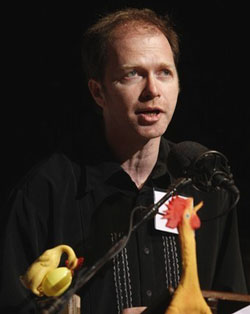Dr. Diego A. Golombek
Diego A. Golombek, Ph.D. is currently full professor of physiology at the National University of Quilmes, where he heads the Chronobiology Lab, and Principal Investigator of the National Research Council of Argentina. He is also the president-elect of the Argentine Society for Neuroscience and on the Editorial Board of Journal of Circadian Rhythms.
Diego combines the worlds of academic science and science communication. His research deals with the world of biological clocks, its synchronization and molecular biology. He is a biology graduate and doctor (summa cum laude) from the University of Buenos Aires, and received postdoctoral training at the University of Toronto. He was research associate at Smith College (Massachusetts) and has been invited professor at many universities in Latin and North America and Europe.
Diego has published over 80 international peer-reviewed papers, as well as many chapters in books. He has also worked as theatre director, musician, and journalist.
His lab aims to understand the basis of circadian entrainment, i.e., what does light tell the circadian clock in order to advance or delay biological rhythms. He studies animal models and also human situations in which entrainment is compromised. Besides his academic publications and supervision of graduate and undergraduate students, he is the author of international patents related to his discoveries in circadian research.
He is the author of several books in science and public communication of science, including: “Biological clocks and calendars”, “Latest news from the brain”, “Caverns and palaces: in search for consciousness in the brain”, “Human chronobiology”, “The scientific cook”, “DNA: 50 years later”, “Demolishing papers”, “Science in the classroom” and “Sex, drugs and biology”. He has also published the novel “Cosa funesta” (Fatality) and the book of short stories “Así en la Tierra” (On Earth as it is in Heaven) which received the National Arts Fund Prize in 2000.
Among others, Diego has received the National Science Prize “Bernardo Houssay”, the Guggenheim Fellowship, the Konex Award in Science Communication and the “City of Mexico” award for his contributions in research and science communication. He also received an “Ig Nobel” award at Harvard University for his research on the use of Viagra in experimental models of jetlag.
He is the editor of the successful book series “Science that barks” and is a frequent collaborator of different communications media. He has hosted programs for Discovery channel and others, and is currently the conductor of the science show “Project G”.
Diego’s books include Cerebro: Ultimas Noticias, Cosa Funesta (Narrativas Historicas), Cavernas y palacios, Asi En La Tierra, El cocinero cientifico, Adn: 50 Anos No Es NADA, Cronobiologia Humana, and Demoliendo Papers: La Trastienda de las Publicaciones Cientificas (Coleccion Ciencia Que Ladra).
His papers include Pituitary Adenylate Cyclase Activating Peptide Phase Shifts Circadian Rhythms in a Manner Similar to Light, Circadian Phase Shifts to Neuropeptide Y In Vitro: Cellular Communication and Signal Transduction, Rhythmicity of the cGMP-related signal transduction pathway in the mammalian circadian system, From light to genes: moving the hands of the circadian clock, Ghrelin Effects on the Circadian System of Mice, Sildenafil accelerates reentrainment of circadian rhythms after advancing light schedules, and Detection of Nonlinear Coupling and its Application to Cardiorespiratory Interaction.
Watch Diego Golombek en México, Expedición Ciencia, Campamento Científico, Diego Golombek Ciencia que ladra… México, GOLOMBEK: La Ciencia y nosotros (parte 1), GOLOMBEK: La Ciencia y nosotros (parte 2), and GOLOMBEK: La Ciencia y nosotros (parte 3).
